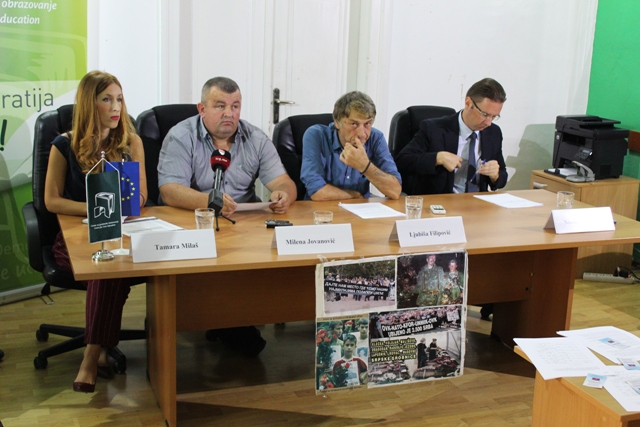Association of families of missing, kidnapped and murdered persons “Crveni Božur” today organised a press conference, in cooperation with the Centre for Civic Education (CCE), regarding the commemoration of 30 August – International Day of the Disappeared.
Tamara Milaš, CCE programme associate and spokesperson of the Coalition for RECOM in Montenegro, once again urged the decision-makers on behalf of CCE and Coalition for RECOM to shed the light on the fates of persons who went missing during the wars of 90s, bring the perpetrators to justice as well as the persons who issued the orders, but also to provide continuous support to those who suffered the most, in order to contribute in the establishment of justice and reconciliation in the region of former Yugoslavia in an efficient manner. “There is a strong impression that Montenegrin institutions do not look forward to solving these cases, since they are not interested to investigate the fates of persons registered as disappeared, and consequently to solve a much larger-scale problem caused by such inaction. CCE insisted on this issue many times before, and this was also included in one of CCE’s recommendations for the latest Report on the implementation of Action plan for Chapter 23, which outlined the obligations of the authorities to precisely inform the public on what was done in order to solve the fates of disappeared persons during the reporting period and thus manifest the devotion to actions related to investigating the fates of all persons who disappeared during the wars of 90s on the territory of former Yugoslavia. Unfortunately, this recommendation was not accepted, and the authorities are still refusing to work with citizens in order to discover the truth on missing persons as soon as possible”, Milaš underlined.
Ljubiša Filipović, president of the association “Crveni Božur”, presented the latest information related to persons who disappeared in Montenegro, on the extent as to what was done so far to unravel the facts on their disappearance, but also on the state in region in terms of the process of investigation, exhumation and the identification of missing persons. He noted that this day “is a brief reminder of the harsh reality that had befallen the families of victims in Kosovo and Metohija. At the same time, we are obliged to raise our voices amid the abundance of other attempts, and seek to determine the truth about those who were violently taken or murdered during the period 1998 – 2002.” Filipović read the open letter, which the Association of families of missing, kidnapped and murdered persons from 1998 – 1999 on Kosovo and Metohija “Crveni Božur”, addressed to Government of the Republic of Serbia and Government of Montenegro, presidents of both states, Commissions for missing persons, Office for Kosovo and Metohija, Red Cross Committee, UNMIK, EULEX, as well as to a great number of other international and state institutions, in which they reminded that “The Geneva Convention on human rights, Second Additional Protocol to the Geneva Convention, the Hague Convention, the Helsinki Accords and many other protocols, are not being respected. People were not protected during the period of crisis, or during the period of post-crisis, they were treated with extreme brutality and inhumanity, and there were even cases of executions”. “Crveni Božur” called the authorities to make urgent amendments to the existing laws, bylaws and administrative procedures, or to adopt the law on missing persons in order to regulate legal, status and administrative issues of families of missing persons.
Nikola Ratković, Minister Advisor at the Embassy of the Republic of Serbia in Montenegro, pointed out that the commemoration of this day is an important event for Serbia and an opportunity to “call all relevant individuals and participants from the international community to take a serious stand on the path of the investigation of fates of missing persons. Republic of Serbia is serious about this issue which is, apart from the humanitarian, also of state and political significance. I would also like to remind of the Mostar Declaration, signed last year between Serbia, Montenegro, Bosnia and Herzegovina and Croatia, which regulates the resolution of these issues in region, however, there was no significant progress in the work of the Commission”.
Miodrag Jovanović, member of the Association “Crveni Božur”, indicated on the fact that “families are the victims of wars, and that behind every person who disappeared or suffered in war and post-war conflicts, stands hundreds of family members and close relatives who do not know the truth on the whereabouts of their suffering”. He added that after 18 years of relentless search for their members, families are exhausted in every sense and that “we must exigently accelerate the work on finding the missing persons”
According to the data of International Red Cross, 34 886 persons disappeared during the period 1991 – 2001. People are still searching for the remains of more than 11 000, while 61 person in Montenegro is registered as disappeared. Apart from that, Montenegro has 82 persons, who are Serbian citizens, and who are registered as missing, whose families moved from Kosovo.
Svetlana Pešić, programme associate

